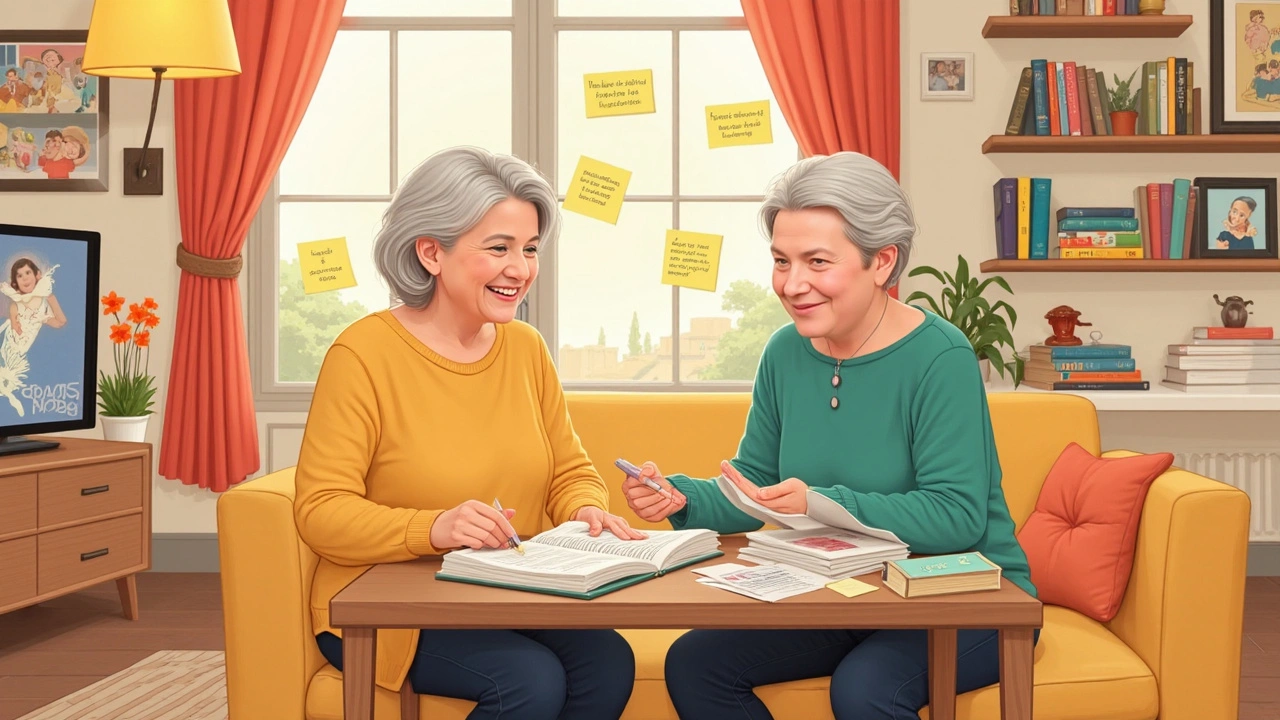Direct Answer – Busting Age Gap Relationship Myths Fast
Here’s the quick truth: Age gap relationships work out just as well as any other kind of relationship, as long as the people involved share mutual respect, honesty, and similar values. Most doom and gloom around couples with big age differences comes from stereotypes, not actual data. Sure, these couples might face extra judgment or challenges, but love itself doesn’t come with a birth date stamped on it. And research? It shows happiness and commitment don’t depend nearly as much on age as people claim. The bottom line: If the connection is healthy and both partners are happy, the age gap is way down the list of things that actually matter.
Key Points – The Takeaways You Need Right Now
- Age gap relationships are more common (and successful) than people think.
- Social stigma is the biggest hurdle, but it doesn’t decide success.
- Shared goals and values trump age in predicting relationship longevity.
- Challenges do exist, especially around family planning or life experience, but they can be managed.
- Communication is the real secret weapon, not the number on a birth certificate.
Comprehensive Guide to Age Gap Relationships: Myths vs. Reality
Some folks think age gap relationships are a recipe for disaster, while others swear they’re the best thing that’s happened to them. I’ll be real with you: Years ago in a dim east London bar, I met Oliver. He’s 14 years older. Adults, both of us, living in the same vibrant city, yet it still surprised people. The reactions ranged from curious stares at dinner parties to “Surely that won’t last.” Why do these comments sting so much? It’s because the world has set ideas about “appropriate” relationships, even though the facts beg to differ.
Here’s what actually happens: Surveys in the UK found that nearly one in four marriages has a gap of ten years or more. It’s not even rare. The real difference with age gap couples is the spotlight: neighbors, colleagues, and even friends sometimes project their own insecurities about aging, power, or loyalty onto your relationship. The wild thing? Research says couples with age gaps report similar, sometimes even higher, satisfaction rates than couples of similar ages. It’s all about what you both bring, not when you were born.
What about those old myths everyone loves to repeat? Like the “midlife crisis” line, or the idea that someone’s just after money or youth. These are tired shortcuts that miss the point entirely. If you dig into actual studies published in journals like “Personal Relationships,” most show that age doesn’t predict relationship happiness or commitment nearly as much as qualities like empathy or trust do. And yeah, there are practical issues—maybe you want kids and your partner is already a parent, or you’re making retirement plans while your partner is building their career. But think about it: all couples face differences, whether it’s money, culture, or career goals. Age is one more factor, not a dealbreaker.

Definition and Context – What’s an Age Gap Relationship Anyway?
An age gap relationship means there’s a notable difference in years between partners. How big does the gap need to be? It depends on who you ask, but most people say 10 years feels “significant.” In pop culture, you see headlines any time a celebrity couple is years apart in age—Meghan Markle is three years older than Prince Harry, while Catherine Zeta-Jones and Michael Douglas have a 25-year gap. You might be surprised to learn that these relationships aren’t a modern invention. If you peek back in history, age gaps in marriages were actually the norm, not the exception.
In the UK, a 2021 report showed that couples with at least a 10-year age difference made up about 17% of all partnerships. Globally, the numbers can be higher, especially in cultures where age gaps aren’t viewed negatively. The stereotypes come mostly from places with rigid ideas about “matching,” but as our society grows more open (and people live longer, healthier lives), these lines are blurring fast.
We can’t ignore the context, though. Sometimes, power dynamics or life stage mismatches create issues—like one person feeling more experienced, or the younger partner not being taken as seriously. But the core of a strong relationship—mutual respect, open communication, shared values—doesn’t change. It’s like learning to ride a bike: whether you start at 6 or 60, you still need balance, practice, and the right kind of support.
Benefits of Age Gap Relationships – Why People Love Them (and What You Can Learn)
Let’s be honest—there are real perks to being with someone older or younger. Ever spent time with a partner who has different life experiences? It opens up your world. My friends joke that Oliver’s stories from “before mobile phones” are better than any Netflix series. Being with someone at a different life stage means you each bring new perspectives, and you’re less likely to fall into boring routines.
Older partners might bring more patience, while younger ones bring fresh energy. There’s research in the Journal of Marriage and Family suggesting that these relationships can help both partners grow by stretching comfort zones. Sometimes the older partner has learned to manage conflict or finances better—useful skills for any household. And if you’re the younger one, you might help your partner stay more adventurous and open to new trends or experiences. It’s like building a team where strengths balance out the gaps.
This isn’t just about “wisdom” or “youth,” though. Some couples find age gaps actually mean less comparison and competition. You’re both in different chapters, so there’s less of that “keeping up with each other” pressure. It can be liberating. Some researchers have even found that age gap couples tend to stay more affectionate and communicative—possibly to counter social judgment, but the result is often deeper intimacy. And let’s not forget, you conquer a fair bit together: judgment, jealousy, and societal noise don’t stand a chance when your connection is rock solid.
Types of Age Gap Relationships and Their Unique Challenges
Not all age gap relationships look the same. Sometimes, the older partner is a decade or more ahead; sometimes, the roles are reversed. In heterosexual couples, it’s more often the man who’s older, but female-led age gap relationships are now on the rise. There are also same-sex couples, where age gaps are more common—about 25% of LGBTQ+ partnerships have at least a ten-year age difference, based on Stonewall's 2022 community survey.
Each type comes with its own flavors of challenge. If you’re the older partner, you might wonder if you’ll have the energy or health for everything your younger partner wants. If you’re younger, sometimes people don’t take your relationship seriously or assume you’re just after “security.” And let’s be real: people’s stares at restaurants never quite go away. My tip? Laugh it off when you can, and talk honestly about how that external pressure feels.
There’s also the life milestones issue. What if one of you wants kids and the other doesn’t, or can’t? What about retirement—or the fact that big age gaps mean planning for each other’s medical care sooner? All valid concerns. The trick is to be brutally honest early and often about your goals and non-negotiables. Some couples thrive by focusing on shared passions that aren’t tied to age—like volunteering, travel, or the arts. Others consciously blend friend groups from different generations, finding support and camaraderie where you least expect it.
To put numbers to it, here’s a handy table comparing different types of age gap couples and common experiences reported in UK surveys:
| Type | Common Age Difference | Reported Main Challenge | Typical Benefit |
|---|---|---|---|
| Older man, younger woman | 10-15 years | Social stigma | Stability from older partner |
| Older woman, younger man | 8-12 years | Judgment over "cougar" stereotype | Fresh perspective from younger partner |
| Same-sex (any) | 10+ years | Community misunderstanding | Blend of experience and novelty |
| Both partners over 50 | 15+ years | Healthcare and future planning | Companionship, shared interests |
Understanding which challenges might pop up can help you spot them—so you’re not blindsided and can actually plan for the future in a way that feels right for both of you.

Age Gap Relationship Success Tips – What Really Works
I won’t sugarcoat it: Age gap couples need solid communication skills. That’s the magic bullet. If you’re upfront about your needs—whether it’s seeing the world or settling down—you’re already ahead of most couples. Here are some real-life tips to keep things strong:
- Be honest early. Don’t avoid tricky conversations about the future. Lay it all out and see if you want the same things.
- Build a support squad. Trusted friends and family can be the difference between weathering a social storm and burning out. Find people who’ve been there or are just plain open-hearted.
- Fight fair. Age means you have different reference points, so it’s easy to misunderstand each other. If you argue, keep things respectful. No talking down, no patronizing.
- Avoid comparison. Forget what the outside world thinks your life “should” look like. Create your own traditions and milestones that fit you both.
- Stay playful. Laughter and new experiences are glue for any couple—mix it up and don’t let routine swallow the spark.
If you want some numbers, a 2023 study from University College London found that couples—regardless of age gap—who have regular “future check-ins” (literal calendar reminders to talk about your dreams and worries) were 30% more likely to describe their relationship as “very happy.” Worth a try, no?
Here’s a little secret: Every couple is a mix of strengths and weaknesses. The “perfect” age is the one where you both show up for each other. If that means you’re a few years (or decades) apart, all that matters is how you treat each other and who you become together.
